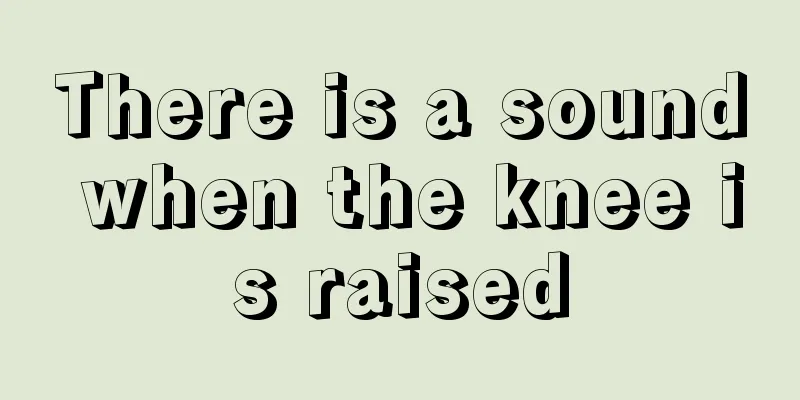There is a sound when the knee is raised

|
The noise when the knee is lifted is mainly caused by knee wear and insufficient oil in the knee, which leads to poor lubrication of the knee. Therefore, we should understand the treatment method of the noise when the knee is lifted. If there is a sound when lifting the knee, we can inject sodium hyaluronate, because sodium hyaluronate can promote the movement of the knee and perform a lubricating function. 1. If your knees make noises, it may be because there is not enough "oil" in the joints. The joints are like the hands that are clasped together in a bow; the clenched fist (joint head) is wrapped inside the other hand (joint socket). In order to reduce the friction between the two hands (two bones), there is a certain gap (joint cavity) between the two hands. The gap is filled with synovial fluid, which acts as a lubricant. These synovial fluids do not exist forever, but are constantly renewed. When the joints move, the synovium is squeezed, producing synovial fluid to lubricate the joints. If you lack exercise and do not "squeeze" the synovial membrane frequently, the synovial fluid in the joints will become less. The joints without lubrication will always make "click, click" sounds, and this sound will make you feel like your knees are being rubbed. In medicine, this is called "knee popping". 2. When young people squat, there is a sound, which may be due to the movement of the kneecap When young people squat or go up stairs, their knees make clicking sounds. Most of the time, this is caused by the inward or outward movement of the kneecap (the bone that protrudes in front of the knee when the legs are bent, called the patella). When you bend your knees, the muscles on both sides of the knee will compete with each other like tug-of-war, trying to pull the kneecap towards you. If the muscles on the inside of the knee are too tight, they will pull the kneecap inward; if the muscles on the outside are too tight, they will pull the kneecap outward. Whichever muscle is stronger will "lead" the kneecap away (the kneecap will tilt to that side), and at the same time will hit other tissues, making a "click, click" sound. How can you be sure that the popping is caused by the movement of the kneecap? First, touch the kneecap, relax and straighten your legs, and you can easily see two pits on the knee. The bone between the two pits is the kneecap. You can ask a friend to help you push your kneecap outwards, then squat down and see if your knee still makes a popping sound. If it does, ask a friend to push your kneecap inwards, then squat down again. If the popping noise disappears during one of the two squats, it can be determined that the popping noise is caused by the inward or outward movement of the kneecap. 3. If your joints make this kind of noise, then there is nothing wrong. The joint cavity is filled with synovial fluid and has no gaps (just like the silicone glue between two tiles, there is no air between them and there is negative pressure inside), which allows the various parts of the joint to fit tightly together and keep the joint stable. However, when the joint moves suddenly, the negative pressure will be broken, and a small amount of gas will enter the joint cavity (someone suddenly wants to separate the two tiles, and air will enter the middle of the silicone). These gases will diffuse throughout the joint cavity and vibrate with the synovial fluid, making a sound. This sound is called physiological clicking and is harmless to the body. 4. What kind of sound is a "physiological sound"? The sound is crisp and discontinuous: The joint snapping sound is particularly crisp and discontinuous, and there will be a period of time between two snaps. Often occurs when a joint moves suddenly: Physiological snapping is the sound made when a joint is suddenly stretched or bent. After the sound, the joints no longer hurt: When this popping sound occurs, you will feel a little discomfort in the joints, but after the sound, the joints will feel much more relaxed and there will be no pain. 5. My knees are always making noises. Will they damage my joints? Slight popping will not cause wear and tear on your knees in the short term, but it does indicate that there is insufficient synovial fluid in your joint cavity. In the future, it is best to do some warm-up exercises before exercising, and then engage in formal exercise after fully warming up. For people with patellar inward or outward displacement, it is best to master the correct exercise method and try to avoid exercises such as squatting and climbing stairs. However, normal physiological clicking will not cause "wear" of the knee joint. |
<<: Is it good to inject sodium hyaluronate for knee pain?
Recommend
What are the methods to whiten facial skin
Everyone wants to have fair and smooth skin, but ...
What screen is good for the eyes_What monitor is good for the eyes
Nowadays, we use computers and mobile phones ever...
Black fungus is a good product for beauty care, but four major taboos must be remembered
Black fungus, also known as wood moth, tree chick...
How about minimally invasive treatment with perforaminal endoscopic discectomy?
The spine is an important bone tissue for people....
Is fasting blood pressure high or low?
People often have abnormal blood pressure, either...
What to do if you have diarrhea and vomiting
Once we eat unclean things, we will have diarrhea...
How to exercise after bone cancer surgery
How to exercise after bone cancer surgery? Physic...
The mouth ulcer has rotted into a deep hole
Many people suffer from oral ulcers in the hot su...
Why do you keep farting when you are constipated
Many people have experienced constipation in life...
What causes excessive sweating in summer
Sweating a lot in summer is a normal phenomenon. ...
How to treat liver cancer in the middle stage better? Recommended Chinese medicine prescriptions for treating liver cancer in the middle stage
In medicine, liver cancer is a very common malign...
How to carry out education towards health?
Education is a great guarantee of health. With ed...
How many days after breast cancer surgery will the stitches be removed
How many days after breast cancer surgery should ...
Can walnuts be refrigerated?
There are many ways to preserve walnuts. They can...
Is it harmful to drink liquor mixed with Red Bull
Liquor is a drink that many people like to drink....









